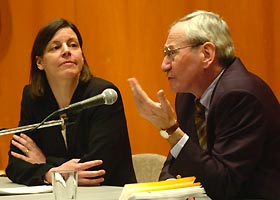|
This is an archived article.
For the latest news, go to the
Advance Homepage
For more archives, go to the Advance Archive/Search Page. | ||
|
Speakers Say Academics May Academics have never made much money by publishing their research, yet even those meager earnings may soon end and researchers will have to pay for the privilege of being published, according to two experts on the current crisis in scholarly communications. But that will be a good thing, say Jean-Claude Guédon and Heather Dalterio Joseph.
Paying to have an article published will check the rising price of scholarly publications, they say, and will help the academic community promote the distribution of scholarly knowledge to the widest possible audience. The two were speaking during a public forum on the crisis in scholarly publishing on March 12. Academic publishing is starting to shift from the traditional model of access through journal subscriptions to one of open access to research results on the Internet, said Guédon and Dalterio Joseph. The free distribution of work that has been peer reviewed and edited would be supported by authors - or their institutions - paying "up-front" for publication. The speakers described the clash of cultures between scholars and the commercial giants of the publishing world that caused the price of academic journals to skyrocket, and said researchers and librarians are now fighting back. Dalterio Joseph said that while the goal of academics is to maximize awareness of their work, commercial publishers are motivated solely by profit. Guédon, a professor of comparative literature at the University of Montreal who has been involved in electronic publishing efforts since 1991, said that as scientific disciplines grew rapidly after World War II, an assumption emerged that every discipline has a core set of journals and that any "self-respecting" library had to buy those journals. This created an opportunity for commercial publishers to buy rights to those journals, increase prices, and make profits that are sometimes as high as 45 percent. Guédon said that around the world, most research is carried out by publicly supported or non-profit institutions, and researchers generally give up the copyright on their work for the privilege of being published. Yet the publishers are selling back the knowledge to the same mostly public institutions, in the form of journals, at a considerable profit. "The companies have found a way to tax governments," he said. The rise in the price of journals has meant that only the richest institutions can buy journals, and this has had a devastating impact worldwide, especially in Third World countries, he said. Publishing giant Reed Elsevier publishes a journal on malaria studies, he noted, yet its high price puts it out of reach of libraries in the countries that most need the information. Dalterio Joseph, president and chief operating officer for BioOne, a collaborative online publishing venture in the biological sciences, said it was once hoped that electronic delivery would level the playing field for the non-profit publishers and bring down journal prices, but that hope has not been realized. "Very few disciplines have gone completely electronic," she said, "so publishers are forced to operate in two worlds, and that takes extra money." The journals that remain paper-based risk limiting their usefulness, she added. "The titles that are read, cited, and used most frequently are those that are most available - those that are online. When I'm doing research, I don't go to the stacks any more; I go to the web." She said the recent, much-vaunted promise of some publishers to limit their price increases should be taken with caution. If Elsevier, for example, packages all its 1,700 journal titles into a single database and offers only one package, a price increase of 7 percent - though smaller than the double-digit increases that have become common - will still be difficult for libraries to cope with. Dalterio Joseph said the academic community must not accept the status quo, but must instead create alternative models for scholarly communication. There are currently a variety of different approaches, including establishing lower-cost journals to compete with those published by commercial companies. "There is a need to keep the cost of publication to the real expense of whatever value is added through the peer review and editorial functions," she said. Another alternative is the establishment of institutional repositories, in which the intellectual property generated by members of the institution is preserved and made accessible by that community. MIT's D-Space and Caltech's Collection of Open Digital Archives are examples of this approach, she said. She urged academics to be aware of a journal's pricing practices before agreeing to submit, review or edit a paper, and to "decline to be part of journals with practices that run counter to the principles of scholarship." The forum was sponsored by the Chancellor's Library Advisory Committee. |

